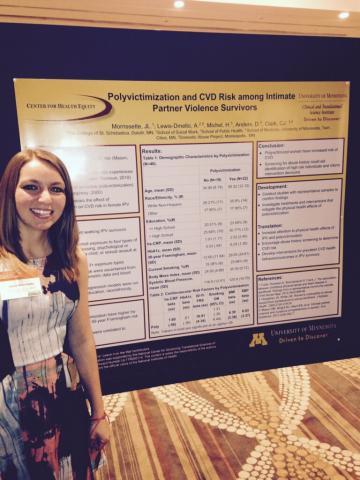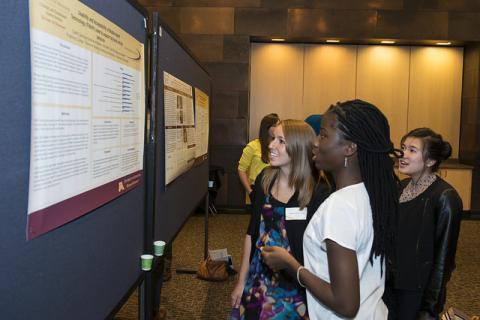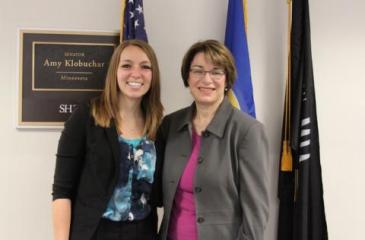Undergraduate student Jamie Morrissette had an experience that many researchers can only dream of: presenting her research to legislators on Capitol Hill.
Morrissette represented the state of Minnesota at the annual Posters on the Hill event, where she shared the results of a study she collaborated on that showed domestic violence’s impact on cardiovascular health.
She presented to attendees ranging from members of the U.S. Congress to NIH staff, and also held individual meetings about her research with Minnesota Senator Amy Klobuchar and staff from Minnesota Representative Tom Emmer’s office.
URP: The start of a research journey
Morrissette conducted and received support for this research while in the Undergraduate Research Program (URP), a joint summer program of the Clinical and Translational Science Institute and the Center for Health Equity.
“Sharing my research with our nation’s policy-makers was a thrilling opportunity, and one that I couldn’t imagine having before I got involved with the Undergraduate Research Program,” says Morrissette. “URP played an enormous role in getting selected for this conference, from connecting me with my invaluable research mentor Dr. Cari Clark to giving me the confidence to put myself and my work out into the community.”
Morrissette, a recent graduate from the College of St. Scholastica, joined the Undergraduate Research Program in 2014 to pursue a long-time interest in health disparities issues. Through the program, Jamie received funding and support to conduct a research project, with the guidance of a research mentor.
Finding support through mentorship
The complementary research interests of University of Minnesota faculty researcher Cari Clark, ScD, caught Morrissette’s eye, and Morrissette began collaborating on one of Dr. Clark’s studies focused on the cardiometabolic health of violence survivors, which was initially funded by a pilot grant from CTSI’s Populations and Community Engagement team.
Like Morrissette, Dr. Clark has also participated in a CTSI research career development program: the KL2 Scholars program, which is focused on helping junior faculty researchers like her build their research careers.
“My mentor through the Undergraduate Research Program has been instrumental to the research I’m doing. Dr. Clark has many impressive studies under her belt, and she is so dedicated to helping me achieve my goals,” says Morrissette.
She adds, “For example, Dr. Clark has given me tons of advice and encouragement along the way – including for the Posters on the Hill opportunity -- and has connected me with a physician so I could learn more about delivering patient care, which is my long-term goal.”
A hands-on, real-world research experience

Morrissette’s research aimed to determine whether there was a correlation between abuse and cardiovascular disease, which she explored by analyzing data collected in partnership with two organizations that help those who experience violence at home: Alexandra House in Blaine, Minn. and Domestic Abuse Project of Minneapolis, which is also the location of the study’s co-Principal Investigator, Angela Lewis-Dmello.
Morrissette analyzed various indicators of cardiovascular disease and diabetes, such as blood pressure, body mass index, and HbA1c, to examine how they related to participants’ responses to a questionnaire about different violent experiences, from sexual assault to witnessing abuse in childhood.
Morrissette’s study found that individuals who experienced multiple violent experiences were at greater risk of cardiovascular disease than those with less complex trauma histories.
Skill-building
In addition to pursuing a mentored research project, URP scholars also participate in weekly seminars and small group discussions to help them develop knowledge, skills, and experience in clinical, translational, and health equity research.
“One of the most valuable things I learned through the Undergraduate Research Program is how to communicate clearly and effectively, and to adapt my approach for whomever I’m talking to. Now I feel like I can help anyone – from scientists to policy-makers to laypeople – understand what I’m researching and why it’s important. It’s a skill I’ll take with me for the rest of my career.”
The educational programming also helped Morrissette gain a translational research mindset. “Throughout all of our discussions, we would always ask ‘how does this translate?’ and ‘how can this cross the threshold into clinical care?’. It’s critical that research doesn’t just sit on a library shelf, but can actually have a real-life impact.”

Creating a network
Another way the program helps position scholars for career success is through networking. Morrissette explains:
“The Undergraduate Research Program opened the door to all sorts of networking opportunities. I was introduced to my mentor whom I continue to have a lasting bond with, connected with fellow students pursuing a diverse range of research interests, and met countless others at conferences where I presented my research. And now, several months after I completed the program, the URP staff is connecting me with community health centers so I can pursue volunteer opportunities to further my career development.”
Advancing to the next level
This is all just the beginning for Morrissette, who hopes to build on what she’s learned so far and ultimately apply health disparities research to patient care. She explains:
“Moving forward, I want to find a way to utilize and apply research that can benefit the community, and help make health equity a reality.”
